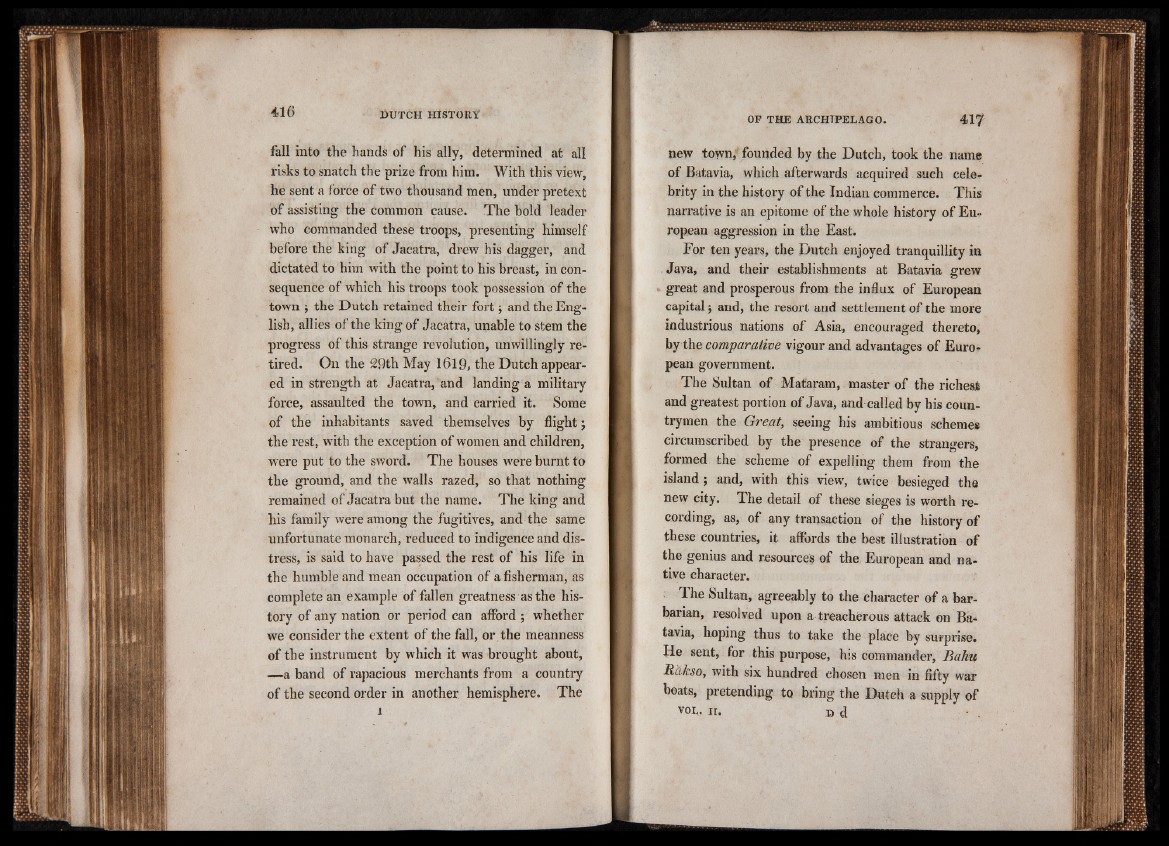
fall into the hands of his ally, determined at all
risks to snatch the prize from him. With this view,
he sent a force of two thousand men, under pretext
of assisting the Common cause. The bold leader
who commanded these troops, presenting himself
before the king of Jacatra, drew his dagger, and
dictated to him with the point to his breast, in consequence
of which his troops took possession of the
town ; the Dutch retained their fort; and the English,
allies of the king of Jacatra, unable to stem the
progress of this strange revolution, unwillingly retired.
On the 29th May 1619, the Dutch appeared
in strength at Jacatra, and landing a military
force, assaulted the town, and carried it. Some
of the inhabitants saved themselves by flight;
the rest, with the exception of women and children,
were put to the sword. The houses were burnt to
the ground, and the walls razed, so that nothing
remained of Jacatra but the name. The king and
his family were among the fugitives, and the same
unfortunate monarch, reduced to indigence and distress,
is said to have passed the rest of his life in
the humble and mean occupation of a fisherman, as
complete an example of fallen greatness as the history
of any nation or period can afford ; whether
we consider the extent of the fall, or the meanness
of the instrument by which it was brought about,
—a band of rapacious merchants from a country
of the second order in another hemisphere. The
new town/ founded by the Dutch, took the name
of Batavia, which afterwards acquired such celebrity
in the history of the Indian commerce. This
narrative is an epitome of the whole history of European
aggression in the East.
For ten years, the Dutch enjoyed tranquillity in
Java, and their establishments at Batavia grew
great and prosperous from the influx of European
capital; and, the resort and settlement of the more
industrious nations of Asia, encouraged thereto,
by the comparative vigour and advantages of European
government.
The Sultan of Mataram, master of the richest
and greatest portion of Java, and called by his countrymen
the Great, seeing his ambitious schemes
circumscribed by the presence of the strangers,
formed the scheme of expelling them from the
island; and, with this view, twice besieged the
new city. The detail of these sieges is worth recording,
as, of any transaction of the history of
these countries, it affords the best illustration of
the genius and resources of the European and native
character.
The Sultan, agreeably to the character of a barbarian,
resolved upon a treacherous attack on Batavia,
hoping thus to take the place by surprise.
He sent, for this purpose, h:s commander, Baku
R&kso, with six hundred chosen men in fifty war
boats, pretending to bring the Dutch a supply of
vol, 4 fid • .